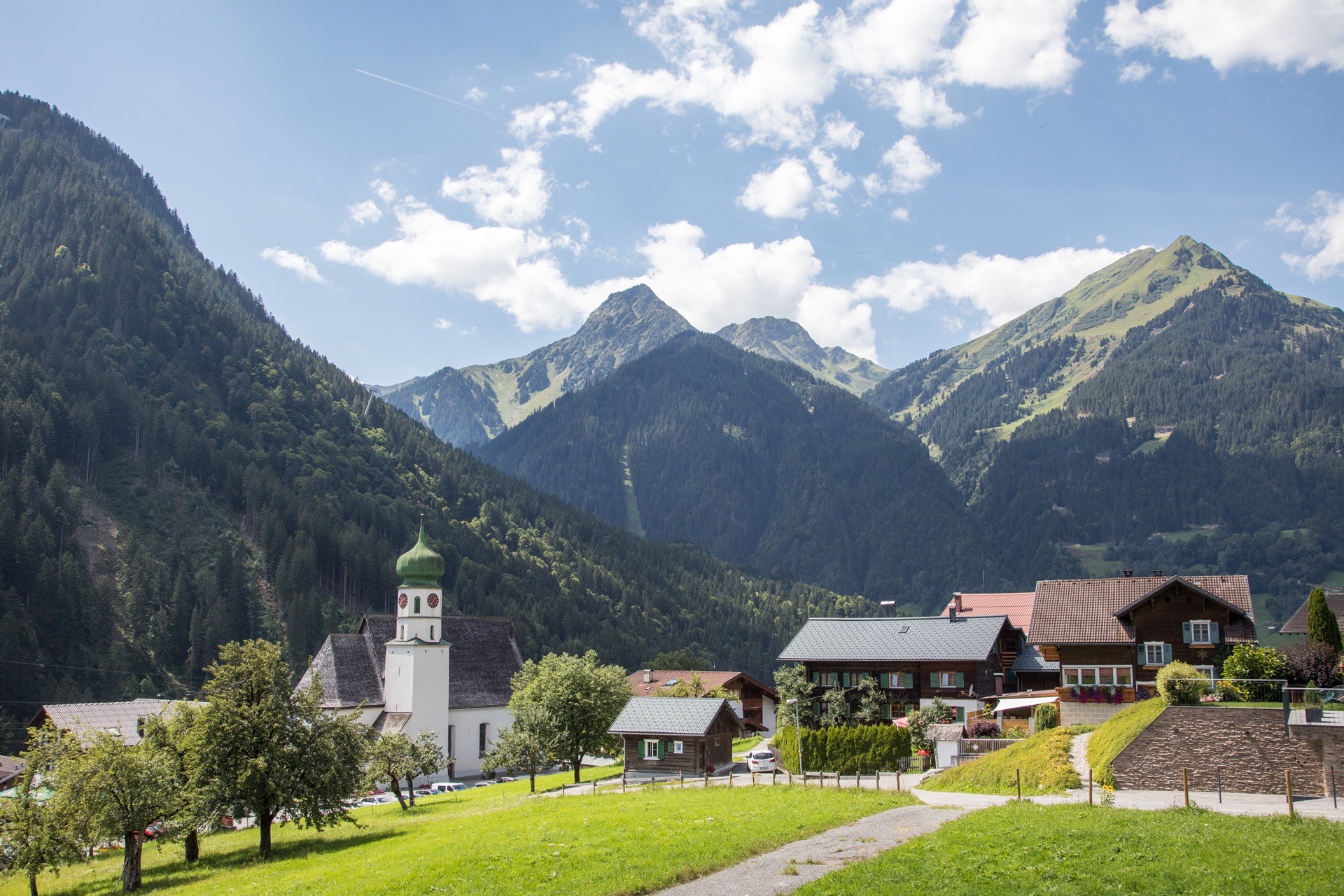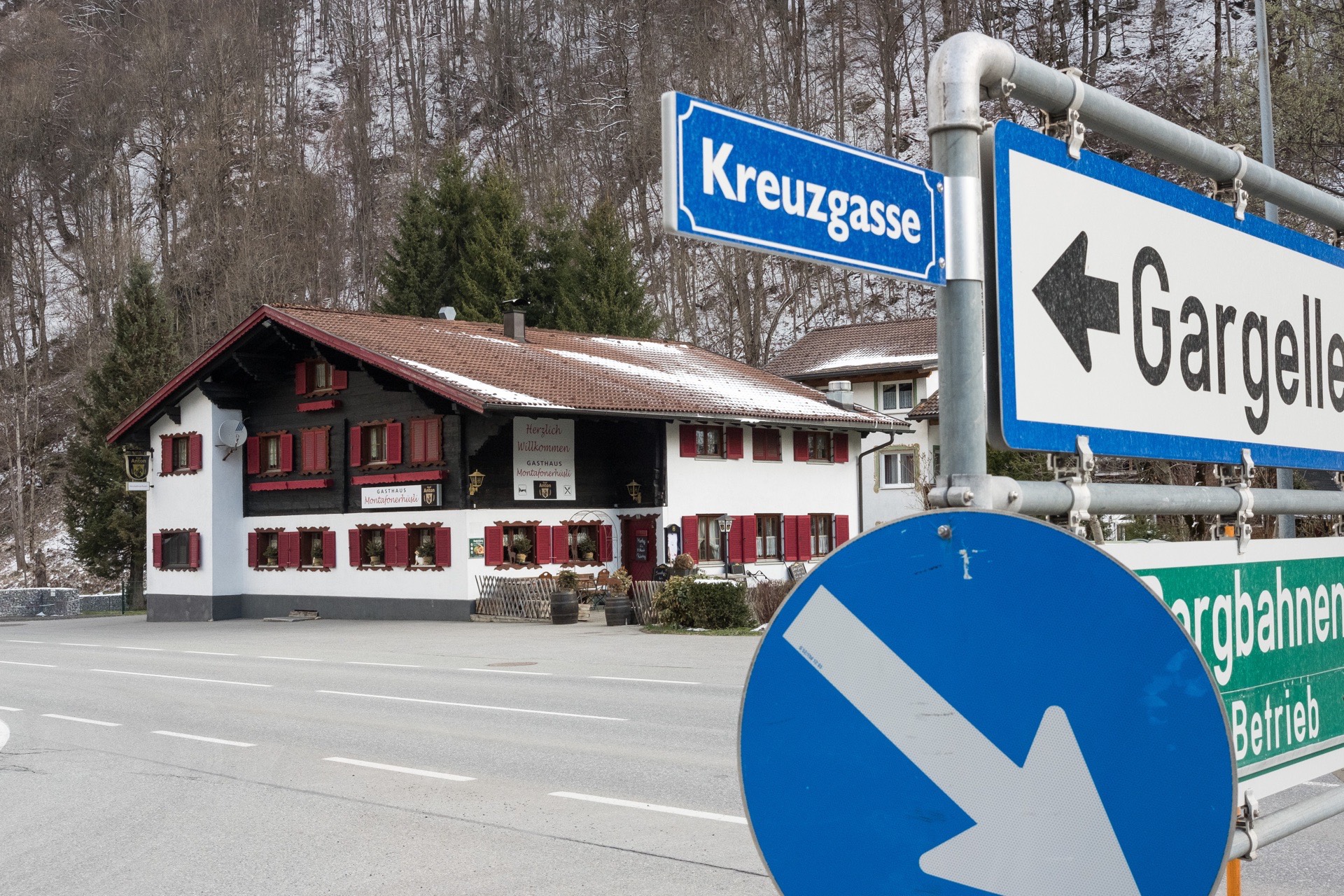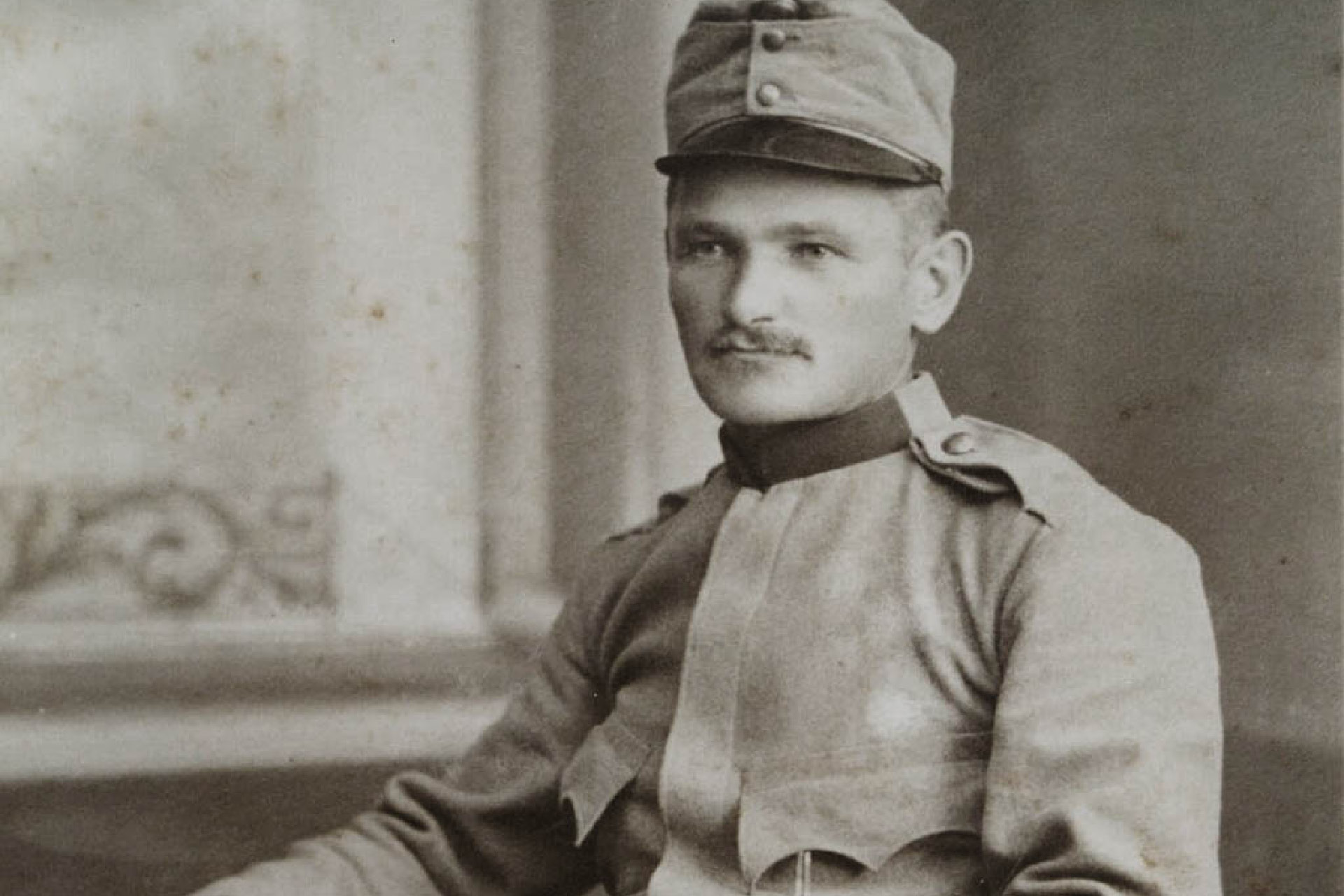Meinrad Juen> 1938 - 1942
49 Meinrad Juen
From smuggler to rescuer: the dazzling adventurer Meinrad Juen
St. Gallenkirch, 1938-1942
In the last days of the war, the National Socialists' allegiance in Montafon collapses. A party meeting on April 20, 1945 is boycotted by most, deserted soldiers hide in the mountains, the Volkssturm forces its release on May 1, resisters try to disarm soldiers. During these days, Meinrad Juen, who had been wanted for a long time, also returns to the village of St. Gallenkirch. Already in June, the gendarmerie post of St. Gallenkirch glorifies the partly chaotic conditions under the pressure of the French advance to Vorarlberg as a successful turn-over. Austria wants to have liberated itself, at least in retrospect. Also in the Montafon.
The courage of the smugglers and traffickers is now positively highlighted.
”At about the same time, Meinrad Juen from St. Gallenkirch, who was arrested 2 ½ years ago and then escaped, and who helped 42 Jews across the Swiss border, also showed himself again among his fellow citizens.”[1]
Meinrad Juen is a legendary figure in the valley today. This was due in no small part to his colorful personality, an adventurer who always resisted authority and the law. Born in 1886 in St. Gallenkirch, he was successful early on as a commercial smuggler of sugar, cigars and coffee, tobacco or saccharin. During World War I, he was able to use cunning to keep himself out of the murderous front lines. After the war, he and his wife Ida temporarily run a small farm and a canteen for construction workers, slaughter and butcher and also smuggle again. But in 1938 – Juen is probably one of the two people in the village who dare to vote against the Anschluss - the smuggling of goods is over for the time being. Now it's all about people. Juen earns quite a bit of money with this, too. His brother Wilhelm helps him.
Herbert Juen, Wilhelm's son, still remembers this time vividly:
“On the Friday before the 2nd Schruns market in 42, (...) they smuggled seven Jews over to Switzerland, yes, many times they smuggled Jews over together. (...) I was a ten-year-old boy there, I helped to feed and groom cows, which had to be driven to the Schruns market at that time. I didn't know where the father was. (...) Suddenly he came sweaty, wet, sweaty, then he changed his clothes and then I had to drive the two cows.”
To the market one came late and earned well. But on the way home, the father tells us that helping the seven Jews escape from Vienna would have brought in more than selling the cows.
“So my uncle and my father, they earned a lot of money, for sure, yes - but (...) it was a matter of survival too.”[2]
The risk they take is high. But they know every rock there, behind which you can find protection from the patrols. And so some feints to distract the border guards. With them, the fugitives even have a chance to take luggage with them, which the brothers haul over the mountain passes from Gargellen. The Montafonerhaus, outside the village, where the path up to Gargellen branches off, serves as the meeting point.
In October 1942, Meinrad Juen is arrested. Whether it is a house search in a Viennese apartment, where a letter with his address is found - or a letter from Switzerland that has been uncovered by the censors? A gendarme, who is also a good customer of his when it comes to shortage goods such as meat or butter, is supposed to take Juen to Schruns to prison. But on the way he allows him to visit his sister Ludwina.
Juen claims to have to go to the bathroom and takes the opportunity to escape through the back door.
For two and a half years Juen goes into hiding, living with various relatives and friends, for example the later mayor Salzgeber. And he again illegally slaughters cattle for the farmers and conducts his black market trade in secret.
Meinrad Juen will continue to make a living from this after the war. He did not lack money. His family life, on the other hand, was less happy. But that is another story.
Four more years are granted to him. On March 3, 1949, he was found dead beside his bed. There were also rumors about his death. But presumably, after his adventurous life, he died quite unadventurously of a heart attack.[3]
[1] Report of the gendarmerie post St. Gallenkirch of June 22, 1945 to the district gendarmerie command in Bludenz, reproduced in: 15 Orte – 15 Geschichten. Texte verorten Erinnerungen an den Nationalsozialismus im Montafon. Schruns 2021, p. 28.
[3] For Meinrad Juen see: Edith Hessenberger, „Menschen-Schmuggler-Schlepper. Eine Annäherung an das Geschäft mit der Grenze am Beispiel der Biografie Meinrad Juens“, in: Edith Hessenberger (Ed.), Grenzüberschreitungen. Von Schmugglern, Schleppern, Flüchtlingen. Schruns 2008, S. 147-176.
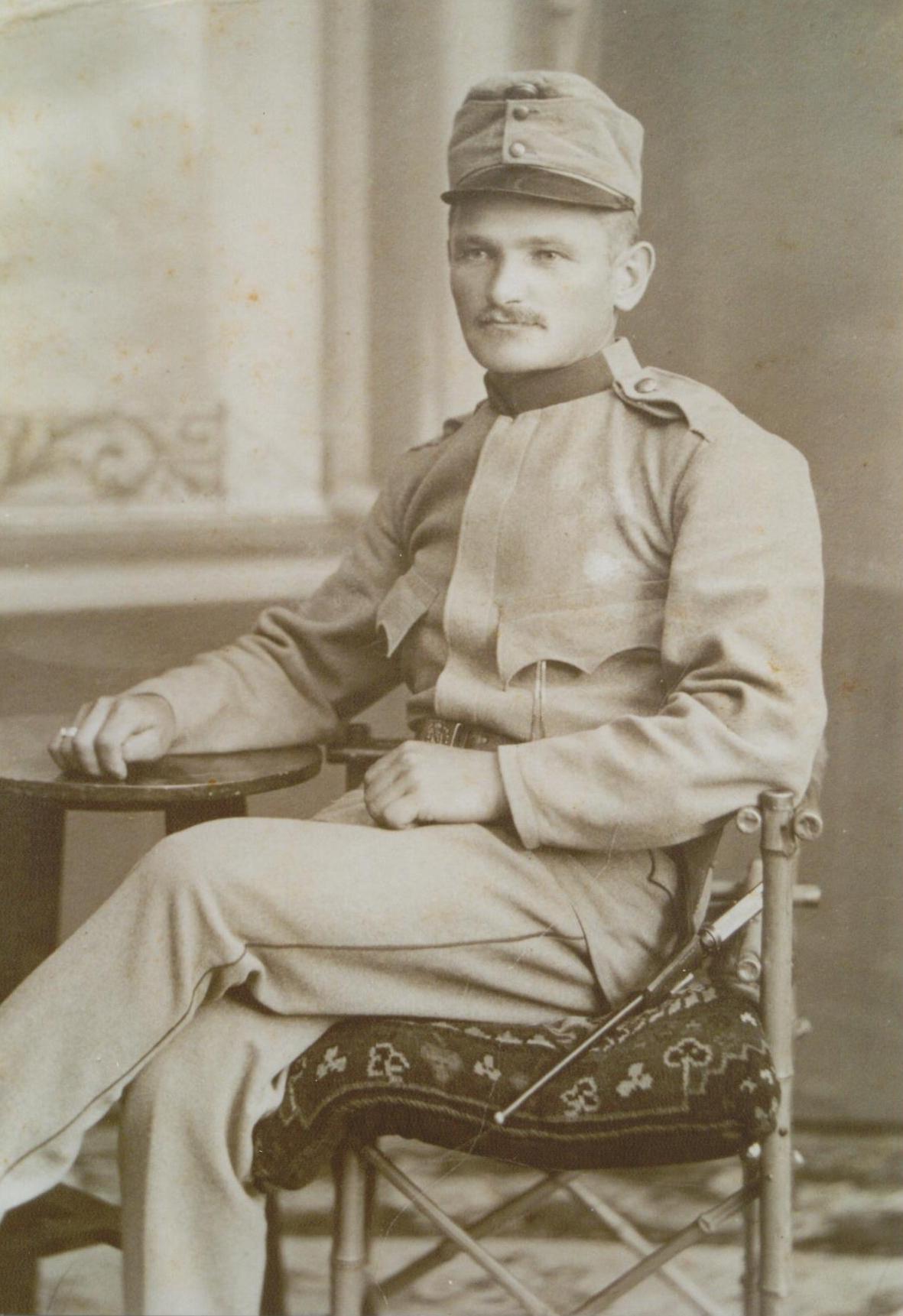
Meinrad Juen, 1914
Montafoner Museen - Archive & Collection, Collection Friedrich Juen
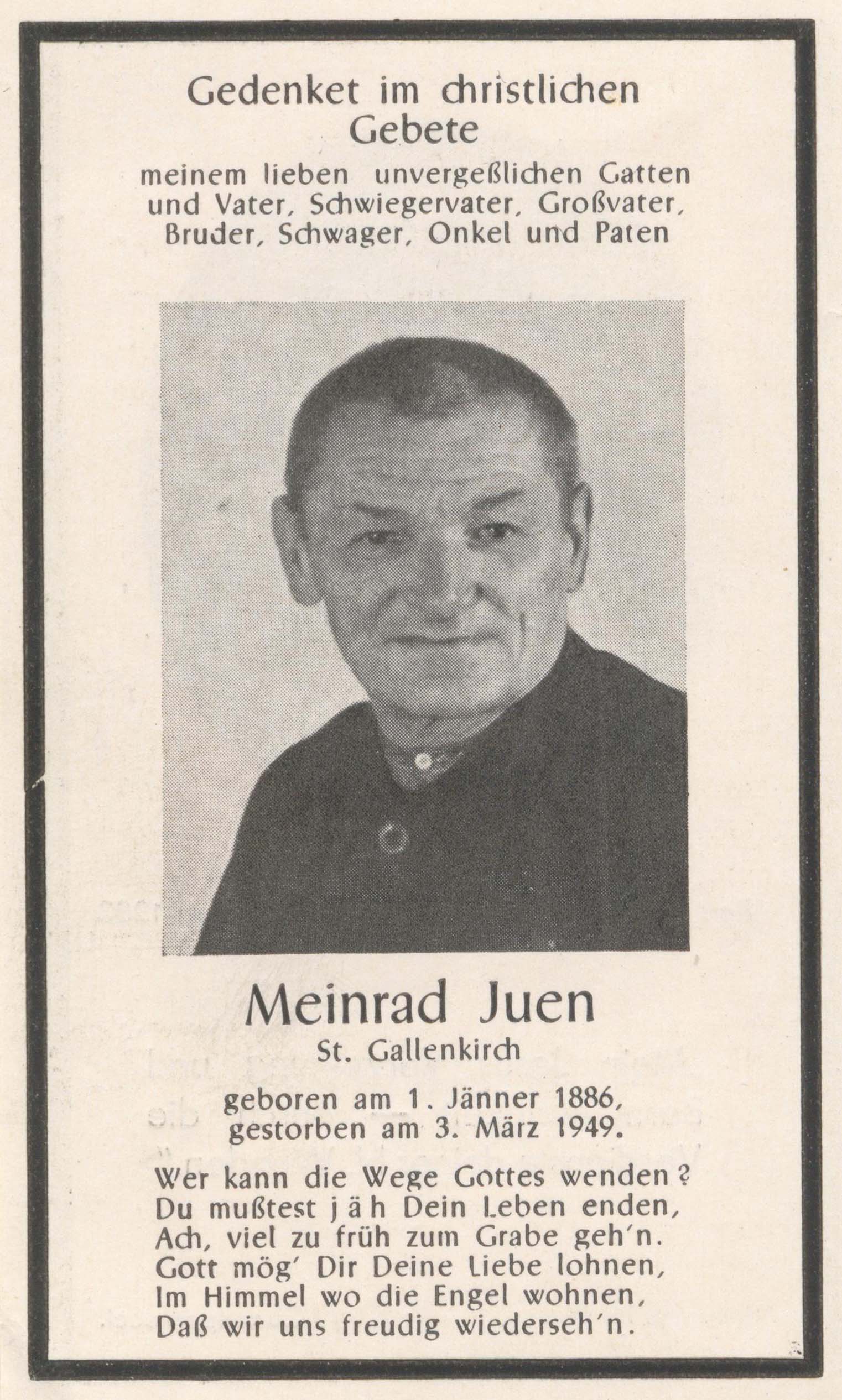
Obituary of Meinrad Juen, 1949
Montafoner Museen - Archive & Collection, Collection Friedrich Juen
49 Meinrad Juen
From smuggler to rescuer: the dazzling adventurer Meinrad Juen
St. Gallenkirch, 1938-1942
In the last days of the war, the National Socialists' allegiance in Montafon collapses. A party meeting on April 20, 1945 is boycotted by most, deserted soldiers hide in the mountains, the Volkssturm forces its release on May 1, resisters try to disarm soldiers. During these days, Meinrad Juen, who had been wanted for a long time, also returns to the village of St. Gallenkirch. Already in June, the gendarmerie post of St. Gallenkirch glorifies the partly chaotic conditions under the pressure of the French advance to Vorarlberg as a successful turn-over. Austria wants to have liberated itself, at least in retrospect. Also in the Montafon.
The courage of the smugglers and traffickers is now positively highlighted.
”At about the same time, Meinrad Juen from St. Gallenkirch, who was arrested 2 ½ years ago and then escaped, and who helped 42 Jews across the Swiss border, also showed himself again among his fellow citizens.”[1]
Meinrad Juen is a legendary figure in the valley today. This was due in no small part to his colorful personality, an adventurer who always resisted authority and the law. Born in 1886 in St. Gallenkirch, he was successful early on as a commercial smuggler of sugar, cigars and coffee, tobacco or saccharin. During World War I, he was able to use cunning to keep himself out of the murderous front lines. After the war, he and his wife Ida temporarily run a small farm and a canteen for construction workers, slaughter and butcher and also smuggle again. But in 1938 – Juen is probably one of the two people in the village who dare to vote against the Anschluss - the smuggling of goods is over for the time being. Now it's all about people. Juen earns quite a bit of money with this, too. His brother Wilhelm helps him.
Herbert Juen, Wilhelm's son, still remembers this time vividly:
“On the Friday before the 2nd Schruns market in 42, (...) they smuggled seven Jews over to Switzerland, yes, many times they smuggled Jews over together. (...) I was a ten-year-old boy there, I helped to feed and groom cows, which had to be driven to the Schruns market at that time. I didn't know where the father was. (...) Suddenly he came sweaty, wet, sweaty, then he changed his clothes and then I had to drive the two cows.”
To the market one came late and earned well. But on the way home, the father tells us that helping the seven Jews escape from Vienna would have brought in more than selling the cows.
“So my uncle and my father, they earned a lot of money, for sure, yes - but (...) it was a matter of survival too.”[2]
The risk they take is high. But they know every rock there, behind which you can find protection from the patrols. And so some feints to distract the border guards. With them, the fugitives even have a chance to take luggage with them, which the brothers haul over the mountain passes from Gargellen. The Montafonerhaus, outside the village, where the path up to Gargellen branches off, serves as the meeting point.
In October 1942, Meinrad Juen is arrested. Whether it is a house search in a Viennese apartment, where a letter with his address is found - or a letter from Switzerland that has been uncovered by the censors? A gendarme, who is also a good customer of his when it comes to shortage goods such as meat or butter, is supposed to take Juen to Schruns to prison. But on the way he allows him to visit his sister Ludwina.
Juen claims to have to go to the bathroom and takes the opportunity to escape through the back door.
For two and a half years Juen goes into hiding, living with various relatives and friends, for example the later mayor Salzgeber. And he again illegally slaughters cattle for the farmers and conducts his black market trade in secret.
Meinrad Juen will continue to make a living from this after the war. He did not lack money. His family life, on the other hand, was less happy. But that is another story.
Four more years are granted to him. On March 3, 1949, he was found dead beside his bed. There were also rumors about his death. But presumably, after his adventurous life, he died quite unadventurously of a heart attack.[3]
[1] Report of the gendarmerie post St. Gallenkirch of June 22, 1945 to the district gendarmerie command in Bludenz, reproduced in: 15 Orte – 15 Geschichten. Texte verorten Erinnerungen an den Nationalsozialismus im Montafon. Schruns 2021, p. 28.
[3] For Meinrad Juen see: Edith Hessenberger, „Menschen-Schmuggler-Schlepper. Eine Annäherung an das Geschäft mit der Grenze am Beispiel der Biografie Meinrad Juens“, in: Edith Hessenberger (Ed.), Grenzüberschreitungen. Von Schmugglern, Schleppern, Flüchtlingen. Schruns 2008, S. 147-176.

